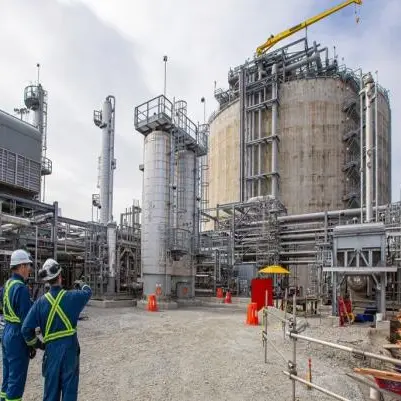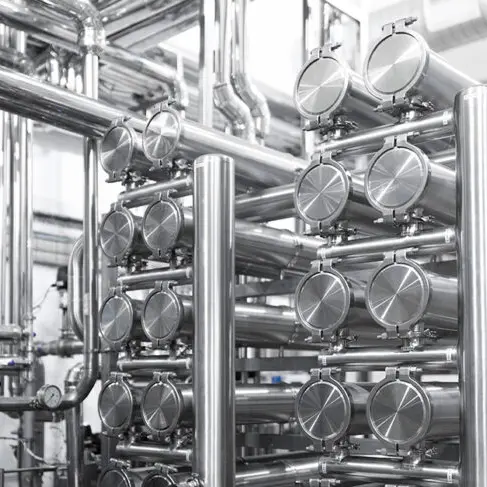Bio LNG

Bio LNG
Bio LNG, derived from waste, advances the circular economy. It “closes the loop” on household, industrial, and agricultural waste, being crucial for sustainable waste management and recycling organic matter into fuel.Ours solution is modular, enabling seamless expansion to accommodate any biogas production volume. This standardized approach not only ensures the ready availability of spare parts but also guarantees the safe and continuous operation of the plant.
Production Feasibility
Bio LNG, a cryogenic renewable bio-fuel, can be manufactured wherever anaerobic digestion (AD) and subsequent liquefaction upgrading are possible. The anaerobic digestion and Bio LNG production processes are vital in addressing clean energy production, environmental protection, and waste management issues.
Multiple Applications
Biogas is purified and liquefied into Bio LNG, which is almost 100% methane. As a renewable energy, the liquefaction of biogas boosts its economic value. Bio LNG (also known as liquefied bio-methane) is especially suitable for energy – intensive manufacturing and industrial companies, as well as the transportation industry.
1.Advantage for Business Transition
For companies currently using LNG, switching to Bio LNG is easy because no adjustments to LNG equipment are needed.
2.Aid for Government Goals
Bio LNG is a crucial means for governments to reach climate action objectives, particularly CO₂ reduction targets. For example, in the EU, there are policies to increase Bio LNG production ten times by 2030.
3.Impact on the Value Chain
Furthermore, mixing Bio LNG with LNG can greatly reduce CO₂ emissions, thus enhancing the existing LNG value chain.
Pretreatment
1.Raw biogas is cooled.
2.Passed through activated carbon beds to remove H₂S and VOCs.
Biogas Upgrading
1.Based on membrane process, CO₂ diffuses faster than CH₄ under pressure.
2.In 3 – stage process, >99% of CH₄ is recovered.
Fine Cleaning and Liquefaction of Biomethane
1.Fine purification to meet biomethane liquefaction specs.
2.Molecular sieve adsorbs residual H₂O and CO₂.
3.Biomethane is compressed to 100 bar, then expanded and cooled through Joule – Thomson valves in several stages.
Liquefaction of CO₂ from Waste Gas Stream
1.CO₂ – containing waste gas from biogas upgrading is cleaned, dried and liquefied.
Storage
1.Bio – LNG at approx. – 150°C is stored in double – walled vacuum – insulated tank for calibrated loading.
Plant Sizes and Production Scalability
Ours solution is modular, enabling seamless expansion to accommodate any biogas production volume. This standardized approach not only ensures the ready availability of spare parts but also guarantees the safe and continuous operation of the plant.
| *Plant Size (Equivalent Electric Power in kWe)* | *Biogas Production (Nm³ per Hour)* | *Biomethane Production (Nm³ per Hour)* | *Bio LNG Production (t per Day)* | *Bio CO₂ Production (t per Day)* |
|---|---|---|---|---|
| 550 | 290 | 160 | 2.5 | 5 |
| 700 | 335 | 190 | 3 | 6 |
| 1,000 | 500 | 275 | 4.5 | 9 |
| 1,400 | 675 | 365 | 6 | 12 |
| 1,700 | 840 | 455 | 7.5 | 15 |
| 2,000 | 1,000 | 545 | 9 | 18 |
| 2,700 | 1,335 | 725 | 12 | 24 |
| 3,400 | 1,675 | 965 | 15 | 30 |
| 4,000 | 2,000 | 1,050 | 18 | 36 |
Our company’s R&D and production of a two – stage membrane process biogas purification and compression equipment has been officially in service at the large – scale biogas project in Anshan. This equipment has an annual biogas treatment capacity of 8 million standard cubic meters and an annual bio – natural gas production of 5.0225 million standard cubic meters.
We’ve created a unique “2 + 1” model. Due to insufficient initial raw materials for customers, to avoid excessive initial investment, based on a 30,000 – cubic – meter biogas purification device, we first provide customers with a 20,000 – cubic – meter biogas equipment. When the raw materials and raw gas increase steadily, we will expand the equipment to a 30,000 – cubic – meter one for free. This not only relieves customers’ worries but also saves them secondary costs.
Currently, this equipment has entered the commissioning and operation period. It has been operating stably for more than 3000 hours, with all indicators within the design range. The owners and leaders from all walks of life have given positive feedback. It provides an important guarantee for local clean and renewable energy.


